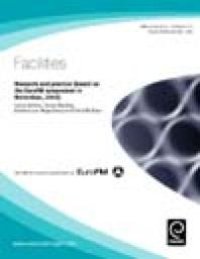
Ebook: Research And Practice (based On The Eurofm Symposium In Rotterdam 2003)
Author: Tomas Mudrak, Andreas Van Wagenberg, Emiel Wubben
- Tags: Ciencias sociales -- Artículos -- Publicaciones periódicas., Social sciences -- Periodicals., Articulos -- Publicaciones periodicas, Libros electronicos.
- Series: Facilities
- Year: 2005
- Publisher: Emerald Publishing Limited
- City: Bradford, United Kingdom
- Language: English
- pdf
FM as a scientific field of inquiry: theory, research and practiceWhen the editors began planning this special issue they asked themselves questionslike: Does facility management exist as a separate field of scientific inquiry and if sowhat is its object of study? Are we not dealing with a topic within management orbuilding science? With these questions in mind the editors of this special issue set outto select and edit a number of articles of the European Facility Management Conferenceheld in Rotterdam in 2003. It is clear from the selected articles that the field emerged only recently. The facilitymanagement references of the selected articles go no further back than 1995. So, thefield has little history yet. We stipulated that facility management should be about the management of the“workplace” and not just about the design and maintenance of a building or aboutwork-processes. We saw the workplace in its broadest sense; within a building, athome, or whilst travelling. This broad scope is the object of study. The inquiry shouldbe about the workplace; its use, its production as well as its maintenance and operation.Workplace is an interactive concept incorporating both the physical/environmentalaspects, as well as, the user aspects by workers. It only arises when both elementscoexist. The workplace is one of several inputs into work-processes affectingemployees. In order to function, a workplace needs a number of facility services. It isalso more of a service than a product. Was this notion of the workplace present in thepresentations at the EuroFM research symposium in Rotterdam? From the presentations and from our own observations we know that there is stilldiscussion about the object of facility management research, its theoretical body ofknowledge and key empirical studies. Some researchers and practitioners still make adistinction between the hard- and soft-services, or premises and business supportservices. We think that this is something of an aside. Facility is a term for a class ofconcepts related to the workplace. It does incorporate hard- and soft-services into ameaningful entity for those that use it (e.g. workers) as well as those that have to takedecisions (e.g. management). A group of researchers and practitioners seem to agreewith our position if one looks at the selected articles. The research in general is skewedto the office workplace. We conclude that the workplace as we described it can be seenas the object of scientific inquiry in facility management. Another question we asked ourselves was: “Is there sound scientific researchrelating to the workplace?” We have brought together quality scientific articles thatdiscuss recent studies that investigate important concepts related to the workplace.These concepts include adaptability, spatial configuration in relation to humaninteraction, effects of sounds and noise on performance of workers, cost monitoringand potential savings, benchmarking of processes and innovation in facilitymanagement. Nearly all discuss findings of original empirical research. We see thisas a healthy sign of development of the field and the answer to the question is positive.However, most studies described here are comparative in nature. This is a sign thatthe field still lacks the kind of financial funding that allows for quantitative researchmethods. Larger samples could be analysed with more sophisticated statistical tools. We encourage the field to go into this direction to strengthen the quality of the researchoutput. A theory of facility or facility management is not yet clearly articulated in theselected papers. Some authors start from the point of view that a facility does affect thebehaviour, health and well-being of workers in one way or another. Examples can befound in the articles of Jesper Steen and Pierre Chigot. Others start with the assumptionthat the workplace and its operation have an influence on the success of organisations.A theoretical framework for facility management should incorporate both. We considerthe lack of a comprehensive theoretical framework in the selected articles a weaknessof the field. Progress in the formulation of theory will strengthen the scientific value ofthe field. The process of alignment of the research and practice is stimulated by theinteraction that occurs among authors when they have the opportunity to physicallymeet and listen to one another who present their work for critique. A great opportunityfor such an interaction are the international conferences and research symposia,organized by the FM associations around the globe. The European FacilityManagement Conference held in Rotterdam in 2003 was one such event, where theFM practitioners and researchers discussed the current managerial and research issuesin the field. Such conferences are of eminent importance to foster discussion about thequestions we asked ourselves. We feel that researchers and practitioners should meetand that the researchers by their research should discover and shape the fundamentalnature of facility management. Previously published in: Journal of Documentation, Volume: 23, Number 34, 2005
Download the book Research And Practice (based On The Eurofm Symposium In Rotterdam 2003) for free or read online
Continue reading on any device:

Last viewed books
Related books
{related-news}
Comments (0)